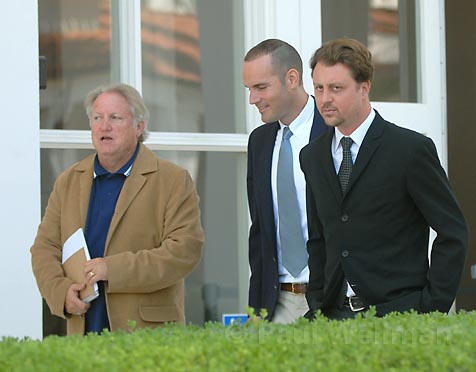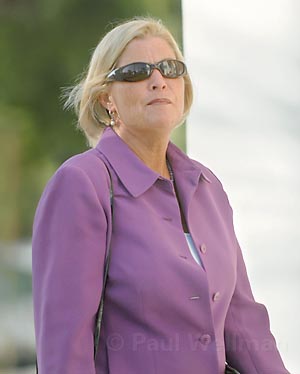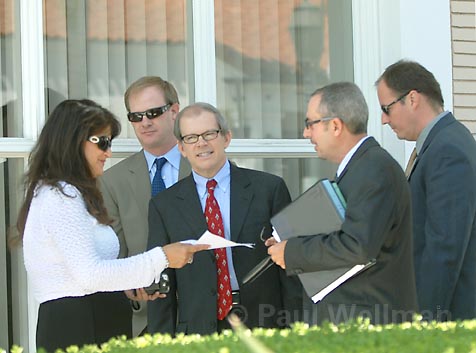Houses Rocked, Wires Crossed, and Emails Hidden
Another Day in the News-Press's NLRB Saga

It’s a saga that’s gripped media watchers around the world, but as the News-Press story rolls through its most critical point – that of the federal government prosecuting the paper for labor law violations – it grinds at an exceedingly dull pace. Such has been the case over the past couple weeks, and it was certainly the case on Wednesday, September 5, in U.S. Bankruptcy Court, when the witness stand was occupied by former newspaper employees Sarah Sinclair (20-plus years in advertising, quit), Tom Schultz (8.5 years of reporting, fired for disloyalty), Barney McManigal (2.5 years of reporting, fired for disloyalty), and Anna Davison (4.5 years reporting and editing, fired for bias).
Slow-moving minutes aside, the day was not without highlights, and, as usual, it offered many insights on to how the News-Press is trying to defend itself, including one possibly problematic situation where the Teamsters did not turn over a fairly significant email. And speaking of that email, whenever slang like “rock the house,” “peeps,” “old skool,” and “badass” gets throw around, every courtroom seems to lighten up a bit. So much so, it seems, that even the News-Press‘ lead attorney Barry Cappello openly ragged on his co-counsel Dugan Kelley, which brought about some needed laughter toward the end of the day.
So here’s the rundown, witness by witness.
Sarah Sinclair
Wednesday morning’s testimony began with Sarah Sinclair, the News-Press‘ former advertising manager. She worked at the paper for more than 20 years before quitting in February 2007 amidst the firings of newsroom employees. NLRB attorney Steven Wyllie brought her on to support the government’s claim that newspaper management was engaged in surveillance of employees during union activities, which is illegal and one of the charges against the paper.

Using a photograph from The Independent, Sinclair, in a bright purple jacket, pointed out a man she had met and knew to be an employee of private detective Nick Montano. She had the seen the man filming in short bursts at two union rallies.
On cross-examination, News-Press co-attorney Matthew Clarke tried to paint the picture that the security guard was taking footage because there was concern that the rallies would cause property damage to the News-Press building. To do so, he asked Sinclair about whether a black wreath had been placed outside of the News-Press during one rally. She said she’d heard about the wreath, but thought it had been delivered.
Clarke then asked about vandalized newspaper racks. Sinclair said that, yes, those racks were vandalized all the time. And then Clarke asked whether Sinclair, who supervised the newspaper’s receptionist in the lobby, had ever suggested having security near the front door. Sinclair responded that she had actually asked for security more inside the building, near the employees.
Her testimony was done quickly.
Tom Schultz
As one of the staff writers fired for taking part in the “Cancel Your Newspaper Subscription” banner drop, former Goleta and general assignment reporter Tom Schultz and his version of events will play a large role in Judge William Kocol‘s final decision. For those who’ve been following the story, most of the relevant details that Schultz testified about – namely the employees’ attempts to deliver a letter to Wendy McCaw last August, the various memos issued by management over the following months, the union meeting with advertisers in the library, the banner drop circumstances, and his termination – are already known.
The issue, then, is whether the judge believes Schultz’s testimony or the version of events offered by News-Press attorney Barry Cappello. A primary spot of contention in that regard is the letter delivery incident, which prompted the suspensions that are one of the charges in this case. Schultz testified that the August 24, 2006 letter delivery incident was not a “march,” that there was no chanting, yelling, or foot-stomping, and that the roughly 15 employees who walked through the office conducted themselves professionally and quietly in trying to give their list of demands to McCaw.
But then during cross-examination, Cappello broke out an email from Schultz to 25 or so employees. In it, Schultz wrote, “Peeps, we rocked the house, crossed their wires, and got ’em unglued.” Schultz also offered in the second line of the email to explain what happened for those who hadn’t been there.
The email had been turned over to Cappello’s legal team by former travel editor Al Bonowitz. No one else, not the Teamsters nor any of the employees included in the email, had done so, and that was troubling for Cappello, for he had issued subpoenas to get all such correspondence. The situation caused a bit of distress for Teamsters attorney Ira Gottlieb, who was directed by the judge to make sure all other documents had been handed over. (Later, it was also suggested that such an email would have helped the News-Press back in January when they were fighting the union vote, but the judge didn’t want to hear any of that.)
Cappello continued, “Did you rock the house, Mr. Schultz?” Cappello then led a semantic study of what “rocking the house” actually meant, believing that it meant making lots of noise and being disruptive, which would be counter to Schultz’s claims of professionalism.
Explained Schultz, “It could mean making noise, or it could mean doing a good job, feeling we succeeded at something.” Cappello asked Schultz where he got such a definition, and he replied, “From my head.”
Cappello then asked why there were more than 25 people on the email list if only 15 participated in the “march.” Schultz was able to name a few people on the list who were not involved in the march, but could not whittle it down to the 15 he counted on the day of the incident.
After lunch, the slang analysis continued based on an email message where Schultz wrote, “Let’s canvas SB with these badass (not to mention old skool letter-pressed) placards.” Cappello asked, “Why did you use the word badass?” Answered Schultz, “I thought they were cool. I thought they were attractive.” His testimony continued over the library meeting, the banner drop, and his termination.
Stepping back from the testimony, two bits of analysis stood out. One, it was a bit ironic that Cappello – who started his case by telling the judge that the younger generation doesn’t wear watches, which was a not-so-subtle echo of McCaw’s earlier commentary where she explained how much she understands the youth – needed a rundown of what fairly common slang terms meant and seemed unable to believe that rock the house might not mean being loud. And secondly, if Schultz’s email was addressed to 25 people who Cappello alleges all took part in the employee “march,” then why would Schultz be offering a rundown for those who weren’t there?
Barney McManigal
Another reporter who was fired after the banner drop, Barney McManigal‘s testimony focused on many of the same things as Schultz’s. He described the letter delivery to McCaw by saying that the group “simply walked.” As to the banner drop, McManigal did say that he was told not to tie the banner to the fence because that would be illegal.
And when asked about the pro-union/anti-McCaw bumper stickers that people can see around town, he responded, “They are still being distributed.” That could be significant because the government is arguing that the News-Press management clearly knew the banner had to do with the union, and if pro-union bumper stickers are still being passed out, that strengthens such a claim.
Then Cappello’s underling Dugan Kelley – who was, coincidentally, the lawyer who helped fire McManigal – got his chance to go after the former reporter. Their exchanges provided some tense drama in the afternoon, but it wasn’t due to Kelley’s probing or McManigal’s surprise. It was due the miscommunication on both their parts, which is to say that while the examination it took awhile, but didn’t amount to much. There was some new insight, however, and at least a little lawyerly humor in the whole episode.
Under cross-examination, Kelley showed that McManigal had been served with a subpoena duces tecum, which required him to bring forth all correspondence that he could find – including emails – related to the case. Kelley tried to ask why he had not produced the Schultz email about rocking the house. But while the former reporter admitted that the email probably entered his inbox, McManigal did not specifically remember reading it, so the foundation was never set.

Instead, Kelley then asked McManigal why he hadn’t produced any emails whatsoever under the subpoena. That made Teamster attorney Ira Gottlieb objected and spin in his chair to find such emails. Strike one for Kelley, who withdrew his question, but did continue to posit that McManigal, who offered quite a few “do not recalls” on the stand, did not produce that many emails.
Later, the government and Teamster attorneys made it clear that McManigal, like everyone else, deletes emails from time to time. Then, at Kelley’s prodding, the judge asked McManigal whether he had intentionally deleted this one in preparation for the case. McManigal looked at the judge and said “no” firmly while shaking his head.
All along the way, Cappello was openly helping Kelley with his questioning, which made for some interesting pauses. At one point, the judge blurted, “Is there something comical, Mr. Cappello?” like a teacher catching a wayward student in class. Cappello replied that there was, and that he was laughing with his co-counsel Matthew Clarke over Kelley’s lackluster performance with McManigal. Kelley, who understandably lost his train of thought, then laughed it off while admitting that his “boss was mocking” him.
Kelley then asked McManigal about his dealing with Leana Orsua, who he had taken out to lunch. Kelley wanted to show that Orsua was a union-supporter, which is something that the government is denying. McManigal said, “She expressed a modicum of support for the union but not her full support.”
Anna Davison
Anna Davison‘s testimony was cut short by the end of the day Wednesday, but Wyllie had her long enough to reveal her extensive resume – she’s got graduate degrees in both botany and science writing, won multiple awards and fellowships for her environmental and science reporting, and even served as an editor at the News-Press over the nearly five years she worked there.
Beyond her accolades, Davison delved into her unexplained beat reassignments: to the City of Carpinteria in August 2006 and to the City of Santa Barbara in January 2007, without having any of her other beats reduced. Davison said she told editor Bob Guiliano that she was “being set up,” to which Guiliano responded that such was “a valid concern.”
Her testimony ended about 4:30 p.m. and is continuing today, September 6, in the U.S. Bankruptcy Court.



